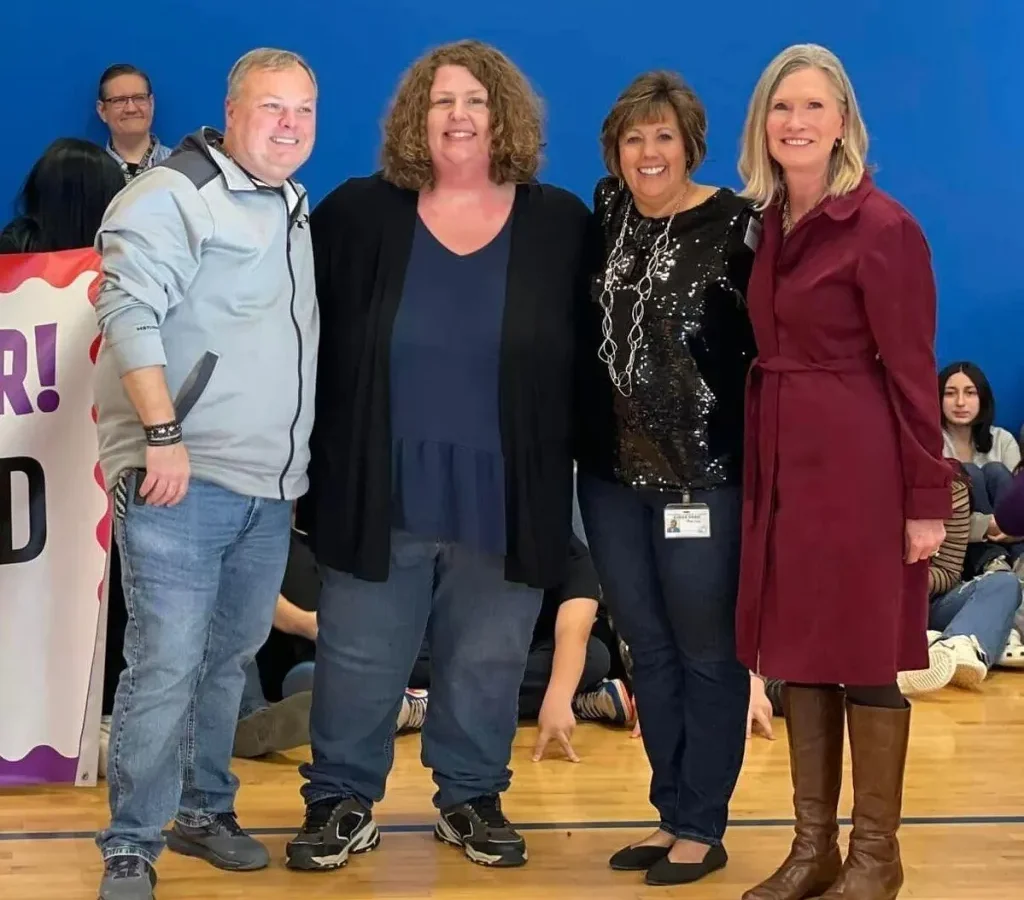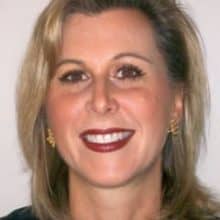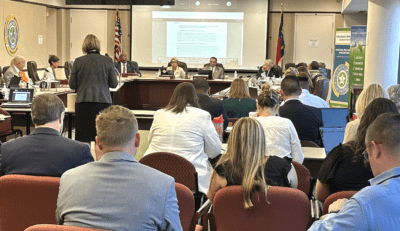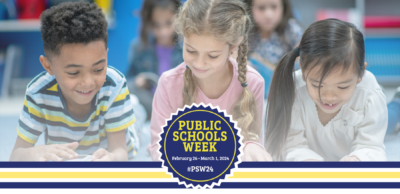
|
|
Editor’s Note: The following piece was originally published on the blog of the North Carolina Coalition for Charter Schools.
The N.C. Department of Public Instruction has named Lee Haywood of Uwharrie Charter Academy (UCA) in Asheboro, North Carolina, the 2024 N.C. Charter School Teacher of the Year. Haywood is also one of nine finalists for the overall N.C. Teacher of the Year honor, which will be awarded April 5.
Recently, Kristen Blair, the Coalition’s communications director, spoke with Haywood about her work as a middle school visual arts teacher, her passion for cultivating creativity in her students, and her goals this year as she represents the state’s charter schools.
We share the full interview below.
Blair: This is your 19th year of teaching. What initially compelled you to pursue a career as an educator?
Lee Haywood: I always thought I would teach in some capacity but didn’t always know what route I wanted to go. I lived with a single mother growing up, and she was my rock. When I was in fourth grade, my mom was diagnosed with an extremely rare form of breast cancer and was given three months to live. She was such an incredibly smart lady. She decided—and this was very brave of her—to pull me out of school, to order a homeschool curriculum, and to teach me at home. Her goal was mainly to spend more time with me, with the time she had left.
It was amazing. We both fell in love—my mom with teaching, and me with learning from her. Even though she was very sick for a little while, we tried to take advantage of every learning experience possible. She kept getting stronger and recovered quicker than anyone thought she would. We loved learning at home and kept doing it for the next three years. I loved being with her. It really lit a fire under me for teaching later on.
In middle school, I wanted to go back—to graduate from the high school that my older brother attended, and to play sports. I had an incredible high school art teacher named Mike Durham, who I watched promote his students in every possible way. So, I had a great, strong model at home and a teacher who inspired me.
I did lose my mom in 2021, but I got about 30 extra years with her that I never thought I would have, and she was able to meet all of her grandbabies.
Blair: What drew you to teach at a public charter school — and to Uwharrie Charter School?
Haywood: I have been in lots of different settings. I went to a traditional public school. My mom pulled me from a magnet school to homeschool me. I taught in a traditional public school for 10 years: I worked in Davidson County and taught in three schools — 1,000+ kids a week — and loved every second of it.
But when I started to plan a family, the schedule wasn’t going to work. I wanted a school that was closer to home, and I was looking for something different. When Uwharrie Charter opened, they started with their high school, but in 2015, the middle school was starting to open. My sister-in-law was one of the first teachers hired at UCA for high school, and I had always heard about how much she loved it. My brother was announced as principal of the new middle school, and he kept saying, “Hey, I know you’re happy where you are, but take a look.”
I walked in for a tour. At that time, the middle school was going to be in an old furniture showroom, so it wasn’t really a traditional school setting. But there was something charming about walking into something that wasn’t a school. It was different. I walked in, and being an art teacher who loves to repurpose things, I saw everything that it could be. I came over and absolutely fell in love with middle school. I finally feel like I am living up to my true potential as a teacher here at UCA.
Uwharrie Charter’s STEAM [science, technology, engineering, arts, and mathematics] program was really appealing to me. Every teacher here has a STEAM class on something they’re interested in, and the kids choose what they take. The first couple of years, I taught a “Diggin’ DaVinci” class about Leonardo DaVinci’s inventions. Now I teach a recycled art class called “Trash to Treasure,” and we explore environmental artists — ones that work with manmade objects, but also environmental artists who work straight from nature.
Blair: Could you tell us why you’re passionate about integrating art across content areas, and why art is so important for student learning?
Haywood: I think it just comes naturally in the art room. To me, it’s never separate. Today I was studying mandalas from India, and we were talking about fractions, dividing a circle into pieces. I also think it’s important for creating that well-rounded student. CEOs cite creativity as the number one thing they look for in a new employee: They’re looking for creative problem solvers. If that’s so important now in our workplace, why aren’t we naturally integrating it into all of our classes—if we’re building a well-rounded student and worker of tomorrow? That’s the biggest reason it’s so important to me, but it happens in my class every day.
Several years ago, I had an idea to get together with other teachers and create an arts night. What we encouraged everyone in the building to do is start pulling out lessons that have any kind of art tie-in. So, we have a “Night at the Museum,” where art is featured in every class. We’ve had a trashin’ fashion show, flash mobs, and poetry slams to celebrate the arts.
Blair: You established a partnership with a local nonprofit organization that takes donated materials to divert trash from landfills. How does this partnership impact your students’ growth as artists, and as members of their community?
Haywood: There is a store in Greensboro, inspired by The Scrap Exchange in Durham, called Reconsidered Goods. They take in and sort discarded materials, bringing them to the floor for sale. They also recycle things for artists to repurpose or upcycle in some way. We have taken several field trips, and have gone to them with ideas that we can focus on here at school. They have a make-and-take lab, where students work on a piece of art there. A lot of times we take it back and finish it here at school.
We’ve created identity trophies, where we took discarded trophies and attached things to them and thought about what our superpowers were. Most recently, we created junk animals out of different materials we found there.
Reconsidered Goods has been more than helpful with my STEAM class and my art students—helping them understand that nothing we throw away can’t be turned back into profit or into something meaningful, aesthetically pleasing, or helpful in some way.
I have also taken some workshops with Bryant Holsenbeck, an environmental artist from Durham. Her work is really what catapulted me to want to do this STEAM work to begin with. I start the kids with looking at the trash islands that float in the oceans, and where they come together because of currents. They really do start to think about what they’re throwing away.
Blair: In December, you were honored as North Carolina’s 2024 Charter School Teacher of the Year. What was that like, and what are your goals for this year?
Haywood: It was an incredible day. I don’t like surprises much, and they pulled one off when I walked in the gym. I couldn’t help but think about my mom, of course—how proud she would be. My family was there. It was an overwhelming experience in the best possible way. You don’t hear what is said about you behind closed doors, so to hear some of the things that were said has been incredibly humbling. I’m very lucky because not everybody gets that chance.
I am super excited to represent charter schools and all of our public school students across North Carolina. The most important part of it all is going to be to listen. I know I have a lot to learn—listening to students, staff, administrators, and leaders to see what changes are needed, and then focusing on that.
A big part of my platform is arts. Eighty-five percent of superintendents say they don’t have enough funding for the arts (ArtNC). That’s definitely something I want to work on. Among the other regional finalists [for 2024 N.C. Teacher of the Year], we have a high school art teacher, a former art teacher, and a teacher with some graphic design background. I feel like it’s a great year to make a real change for the arts. That’s my goal.
Blair: What is your favorite charter school moment?
Haywood: It’s easy for me. I remember the first time I ever left my classroom during STEAM. Walking through the hall during that STEAM time, our school came alive. There was hammering going on down the hall; kids were painting in the hallways. We had a CrossFit STEAM, and they were flipping giant tractor tires through the gym. There was a teacher with a dog training class—and a radio broadcast, a news channel, and smells from our bakery.
It was such a beautiful moment. The school came alive with all of this hands-on learning. I’ll never forget that moment—hearing the sounds, and smelling the smells, and seeing the sights. It was like living in a small city. I believe in our STEAM program. That’s what our school is built on.
That was a great charter school moment for me.
Blair: Is there anything I didn’t ask that you believe is an important part of this conversation?
Haywood: I’m a teacher mentor and have been for a really long time. That’s part of my platform. I’m big on working with beginning teachers, because we have lost so many since the pandemic—and also the rejuvenation of veteran teachers, post pandemic, with professional development.
So, I’m passionate about professional development for all teachers, and learning to go in, all the way, if you’re going to commit to this profession. It’s an impossible job; we have so many hats. But it is so worth it! “Never be average” is written on my board. Don’t come in halfway. Our students deserve your absolute best, every single day.
Read more about Lee Haywood in the Courier-Tribune.





